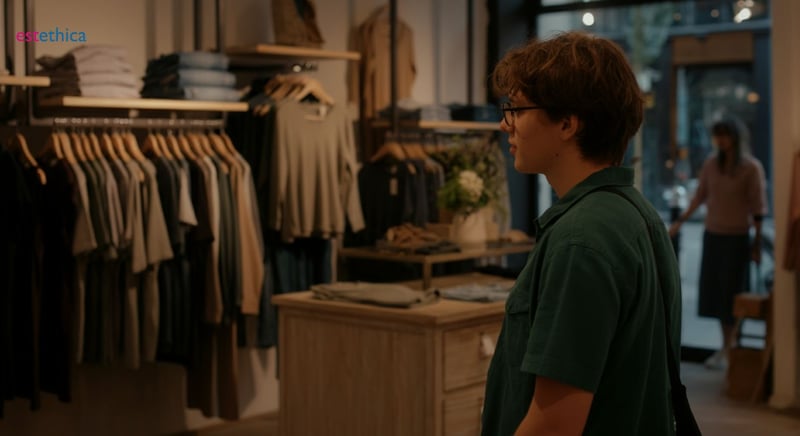Discover estethica: Your Path to Sustainable Fashion Choices
Learn how sustainable fashion can transform your wardrobe with eco-friendly choices.
The world of fashion is undergoing a significant transformation, where ethics and sustainability are at the forefront. As conscientious consumers seek to make a positive impact, sustainable fashion is reshaping how we think about clothing. But what exactly does this mean, and how can we incorporate eco-friendly choices into our everyday lives?
This guide explores the depth of sustainable fashion, offering insights on understanding its principles, finding ethical brands, and selecting eco-friendly clothing for every season. From the benefits of sustainable apparel to practical tips on how to shop ethically, discover the compelling reasons to transition to greener fashion choices.
Understanding Sustainable Fashion: What You Need to Know
Key Elements of Sustainable Fashion
Sustainable fashion focuses on creating clothing that respects both the environment and workers' rights. It involves using organic and recycled materials, which significantly reduce the environmental impact. For instance, organic cotton requires 91% less water than conventional cotton, making it a more sustainable choice.
- Organic Materials: These materials are grown without harmful pesticides, promoting soil health and biodiversity.
- Recycled Fabrics: Using recycled materials reduces waste and conserves resources, such as water and energy.
- Transparent Supply Chains: Transparency ensures ethical labor practices and helps consumers make informed choices.
Moreover, sustainable fashion brands often prioritize reducing carbon emissions during production. For example, some companies have adopted renewable energy sources to power their factories, cutting down on their carbon footprint. This commitment to sustainability not only benefits the planet but also appeals to environmentally conscious consumers.
Steps to Identify Sustainable Fashion Brands
- Research Brand Practices: Look for brands that disclose their production processes and material sources.
- Check Certifications: Certifications like GOTS (Global Organic Textile Standard) indicate adherence to sustainable practices.
- Read Reviews: Consumer reviews can provide insights into a brand's commitment to sustainability and ethics.
Understanding these elements can guide you in making more eco-friendly fashion choices. For further insights, explore Unlocking estethica: Your Path to Eco-Friendly Fashion Choices.

How to Find Ethical Fashion Brands That Align with Your Values
Identifying Ethical Fashion Brands
Finding ethical fashion brands involves understanding your values and conducting thorough research. Start by identifying brands that prioritize fair trade, ensuring fair wages and safe working conditions for their workers. For example, brands like People Tree and Patagonia are known for their commitment to ethical labor practices.
- Fair Trade Commitment: Look for brands that support fair wages and safe working environments.
- Transparency in Manufacturing: Brands should openly share their production processes and material sourcing.
- Use of Eco-Friendly Materials: Opt for brands using organic or recycled materials to minimize environmental impact.
Additionally, consider brands that are transparent about their manufacturing processes. Transparency helps consumers make informed decisions and ensures that brands are held accountable for their practices. Brands like Everlane and Reformation provide detailed information about their supply chains, promoting ethical consumerism.
Certifications to Look For
- Fair Trade Certified: Indicates adherence to fair labor practices and sustainable production.
- Global Organic Textile Standard (GOTS): Ensures organic status of textiles, from harvesting to labeling.
- B Corp Certification: Recognizes companies meeting high social and environmental performance standards.
Certifications play a crucial role in identifying ethical fashion brands. For instance, the Global Organic Textile Standard (GOTS) certification ensures that textiles are organic from harvesting through manufacturing. B Corp Certification, on the other hand, recognizes companies that meet high standards of social and environmental performance, accountability, and transparency. By focusing on these certifications, you can confidently choose brands that align with your ethical values.

Top Eco-Friendly Clothing Options for Every Season
Seasonal Sustainable Fashion Choices
Embracing sustainable fashion doesn't mean sacrificing style or comfort. Each season offers unique opportunities to incorporate eco-friendly clothing into your wardrobe. For summer, breathable organic cottons are ideal, providing comfort and reducing environmental impact. Brands like Pact and Thought Clothing offer stylish options that keep you cool while being kind to the planet.
- Organic Cotton: Perfect for summer, it uses less water and no harmful pesticides.
- Recycled Wool: Ideal for winter, it provides warmth while reducing waste.
- Plant-Based Fabrics: Versatile for any season, they offer sustainable alternatives to synthetic materials.
In winter, recycled wool and plant-based materials like Tencel or hemp provide warmth without compromising sustainability. Brands such as Patagonia and Eileen Fisher focus on using recycled and natural fibers, ensuring that your winter wardrobe is both cozy and eco-conscious. These materials not only offer comfort but also support a more sustainable fashion industry.
Eco-Friendly Dyeing and Artisanal Crafts
Choosing clothing that uses eco-friendly dyeing processes is another way to support sustainable fashion. Brands like Colorant and Kotn prioritize natural dyes, which minimize water pollution and reduce chemical use. This approach not only protects the environment but also enhances the longevity and vibrancy of the garments.
- Natural Dyes: Reduce environmental impact and enhance garment longevity.
- Support Artisans: Choose brands that collaborate with artisans, preserving traditional crafts.
- Prioritize Quality: Opt for durable clothing that withstands seasonal changes.
Supporting brands that collaborate with artisans helps preserve traditional crafts and promotes ethical production. For example, brands like Maiyet and Indigenous work closely with artisans, ensuring fair wages and sustainable practices. By choosing these brands, you not only embrace unique styles but also contribute to a more equitable fashion industry.

The Benefits of Choosing Sustainable Apparel for Your Wardrobe
Durability and Timeless Style
Opting for sustainable fashion offers more than just environmental benefits. Sustainable apparel is often crafted from high-quality materials, ensuring durability and longevity. For example, hemp and organic cotton are known for their strength and resilience, reducing the need for frequent replacements. This durability not only saves resources but also provides a timeless style that remains fashionable across seasons.
- Resilient Materials: Hemp and organic cotton offer strength and longevity.
- Timeless Designs: Sustainable fashion often features classic styles that transcend trends.
- Reduced Replacements: Durable clothing minimizes the need for frequent purchases.
Furthermore, sustainable fashion often emphasizes timeless designs, allowing you to build a wardrobe that remains stylish year after year. Brands like Stella McCartney and Eileen Fisher focus on creating pieces that are both fashionable and enduring, ensuring that your wardrobe investments are worthwhile.
Enhancing Your Personal Brand
Supporting eco-friendly clothing not only benefits the planet but also enhances your personal brand. As consumer awareness of environmental issues grows, aligning with ethical fashion brands can positively impact your image. For instance, wearing clothing from brands like Patagonia or Veja signals a commitment to sustainability, resonating with like-minded individuals and communities.
- Align with Values: Choose brands that reflect your commitment to sustainability.
- Boost Brand Story: Incorporate eco-friendly clothing to enhance your personal narrative.
- Connect with Community: Engage with a network of environmentally conscious individuals.
By choosing sustainable apparel, you contribute to a narrative that values ethical practices and environmental responsibility. This choice not only reflects personal values but also connects you with a community that prioritizes sustainability, fostering meaningful relationships and collaborations.
Innovative Approaches to Sustainable Fashion
Eco-Friendly Fashion Choices for Every Season
Frequently Asked Questions
What is sustainable fashion and why is it important?
How can I find ethical fashion brands that align with my values?
What are some eco-friendly clothing options for different seasons?
Why should I choose sustainable apparel for my wardrobe?
What certifications should I look for in ethical fashion brands?
Discover the path to your healthiest and most beautiful self with estethica's award-winning services. Call now for a free consultation and let our expert team guide you on your journey to wellness and beauty.
📞 Call for Your Free Consultation Today!